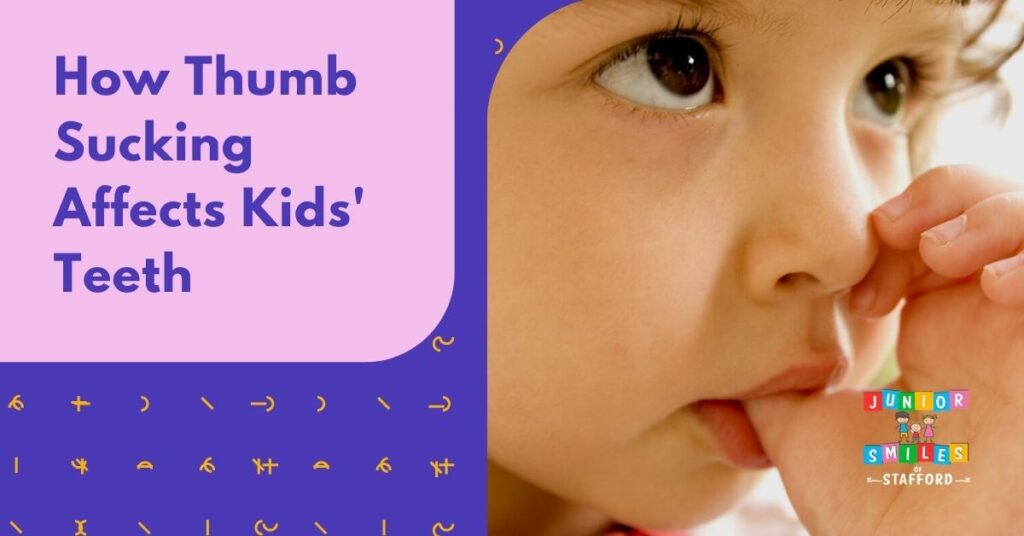How Thumb Sucking Affects Kids’ Teeth

Thumb sucking is a natural reflex for children, offering comfort and security. However, this seemingly innocent habit can have significant implications for a child’s dental health.
In this article, we delve into how thumb sucking affects kids’ teeth, exploring its impact on dental alignment and overall oral development. We’ll examine the potential long-term effects, such as changes in the roof of the mouth and teeth misalignment, and provide insights into when and how to address this habit for the sake of your child’s dental well-being.

Why Do Children Suck Their Thumb?
Children suck their thumbs for a variety of reasons, but comfort and security are the most prominent. This habit is often associated with a need for self-soothing when children are faced with situations they find stressful or unfamiliar. The act of thumb sucking releases endorphins, which reduce stress and promote a feeling of calm.
Self-soothing During Stressful Times
Children may resort to thumb sucking in response to stress or when they are feeling anxious or upset. The familiar sensation of thumb sucking can be immensely comforting to a child, akin to the use of a security blanket. It provides a reliable retreat to a state of calmness from the overwhelming situations that a young child’s developing emotional regulation skills can’t yet handle.
Boredom or Tiredness
Often, when children are bored or tired, they will suck their thumb as a simple pastime or as a preliminary step to falling asleep. It’s an easily accessible way to pass the time and has an inherently soothing effect, much like rocking or being cuddled. In many instances, thumb sucking is integrated into the bedtime routine, becoming a cue for the child that it’s time to sleep.
Hunger
For infants especially, thumb sucking is frequently a signal of hunger, engaging their natural sucking reflex that’s also associated with feeding. Before they can articulate hunger verbally, babies may express their need for nourishment through thumb sucking. It’s also a part of exploratory behavior where babies learn about their world by putting things in their mouth, including their thumbs.
Adjusting to New Situations
The introduction of new experiences or changes in the child’s environment, such as the arrival of a new sibling, starting school, or moving to a new home, can lead to increased thumb sucking. This habit provides a bridge of familiarity, allowing the child to carry a piece of home or constancy with them. It’s a way for children to maintain a sense of normalcy during transitions that are beyond their control.
Effects of Thumb Sucking on Child’s Teeth
Tooth Misalignment
One of the dental issues from thumb sucking is tooth misalignment since the upper teeth eventually grow to cover the lower teeth in a normal bite. Normal tooth eruption and even jaw growth can be compromised by the pressure of a thumb, finger, or pacifier sitting on the gums. When a kid bites together, the teeth don’t overlap, but rather, there is an open gap between the top and lower teeth in a thumb sucker that develops an “open bite.”
Malocclusion
Malocclusion refers to misalignment of teeth that can occur when the sucking motion creates pressure on the teeth and jaw. An open bite can affect how a child chews and the appearance of their smile, which may influence self-esteem. Additionally, it can predispose the child to more dental problems as the misalignment often makes oral hygiene more challenging.
Speech Issues
The dental changes caused by thumb sucking, such as the development of an open bite, can have a cascading effect on a child’s speech. Altered teeth alignment and jaw structure can impede proper pronunciation, leading to challenges with articulation, lisping, and other speech impediments. These issues might require intervention from speech therapists to correct.
Germs and Infections
A child’s hands are in constant contact with various surfaces and can carry a host of bacteria and viruses. When a child puts their thumb in their mouth frequently, there is an increased risk of introducing these germs into their system, which can lead to illness and oral infections. Furthermore, the constant presence of a thumb in the mouth can create a moist environment conducive to the growth of yeast and bacteria.
Palate Problems
The sucking action can not only reshape the alignment of teeth but also affect the roof of the mouth. Prolonged thumb sucking can cause the palate to become more narrow and high-arched, leading to difficulties in speech and eating. This altered shape can be uncomfortable and might necessitate orthodontic treatment for correction.
Thumb sucking isn’t always harmful to the mouth and teeth. Passively holding the thumb in the mouth, for example, does not usually cause harm. Active thumb sucking with lots of movement might cause damage to the baby’s teeth, although this normally corrects itself when the permanent teeth come in.
How To Break The Vigorous Thumb Sucking Habit
Thumb sucking is a common and normal behavior in young children, offering comfort and security. However, when the habit becomes vigorous and persists past the preschool years, it may be time to intervene. Breaking the habit gently and effectively is crucial to prevent any long-term dental or speech issues.
The Natural Timeline for Thumb Sucking
Between the ages of 2 and 4, most children naturally stop sucking their thumbs as they develop other coping mechanisms. This process usually happens gradually and without much intervention. However, it’s essential to monitor their progress and ensure that the habit diminishes over time to prevent dental issues.
Introducing Pacifiers as an Alternative
If you’re concerned about your child’s thumb sucking and prefer that the behavior resolves sooner, consider introducing a pacifier as a substitute. Pacifiers are often easier to remove from a child’s routine as they do not provide the same self-soothing effect that a thumb does. That said, pacifier use beyond the recommended age can also pose issues, so it’s best to use this method strategically.
The Power of Positive Reinforcement
When it comes to encouraging your child to stop thumb sucking, positive reinforcement can be far more effective than negative consequences. Instead of reprimanding them, try celebrating moments when they choose not to suck their thumb. You could create a reward chart or offer praise and small rewards, as this can build their motivation to quit the habit.
Creative Strategies to Encourage Quitting
Being creative with your approach can lead to finding a unique solution that resonates with your child. You might tell a story about how the thumb needs rest to help the child’s teeth grow strong, or perhaps invent a game where not thumb sucking earns points towards a desired reward. Another imaginative tactic is to involve the tooth fairy, suggesting that they can send their pacifiers to the fairy in exchange for a small gift.
Identifying and Distracting from Triggers
Distract your child from thumb sucking by identifying what triggers the habit. If they suck their thumb when stressed, offer reassurance through words, a hug, or engage them in a calming activity. If boredom is the trigger, keep their hands occupied with fun and engaging activities such as arts and crafts, playing with toys, or interactive games.
The Role of Your Pediatric Dentist
Consulting your pediatric dentist is an essential step in managing your child’s thumb sucking habit. Your dentist can provide personalized advice on oral hygiene techniques suitable for thumb suckers and help monitor your child’s dental growth closely. Maintaining a regular dental exam schedule starting at the age of 1 is crucial, not just for tracking the cessation of thumb sucking, but also for ensuring overall oral health.
Contact Junior Smiles of Stafford to Prevent the Effects of Thumbsucking in Your Child’s Teeth
As parents, monitoring your child’s thumb sucking habits and seeking professional advice when necessary is vital. If you have concerns about your child’s thumb sucking and its effects on their dental health, don’t hesitate to reach out to the experts. Junior Smiles of Stafford, renowned for their expertise in pediatric dentistry, is here to help.
Our team is dedicated to providing comprehensive care and guidance to ensure your child’s dental health is on the right track. For more information or to schedule an appointment, contact us. Your child’s smile is our priority!

